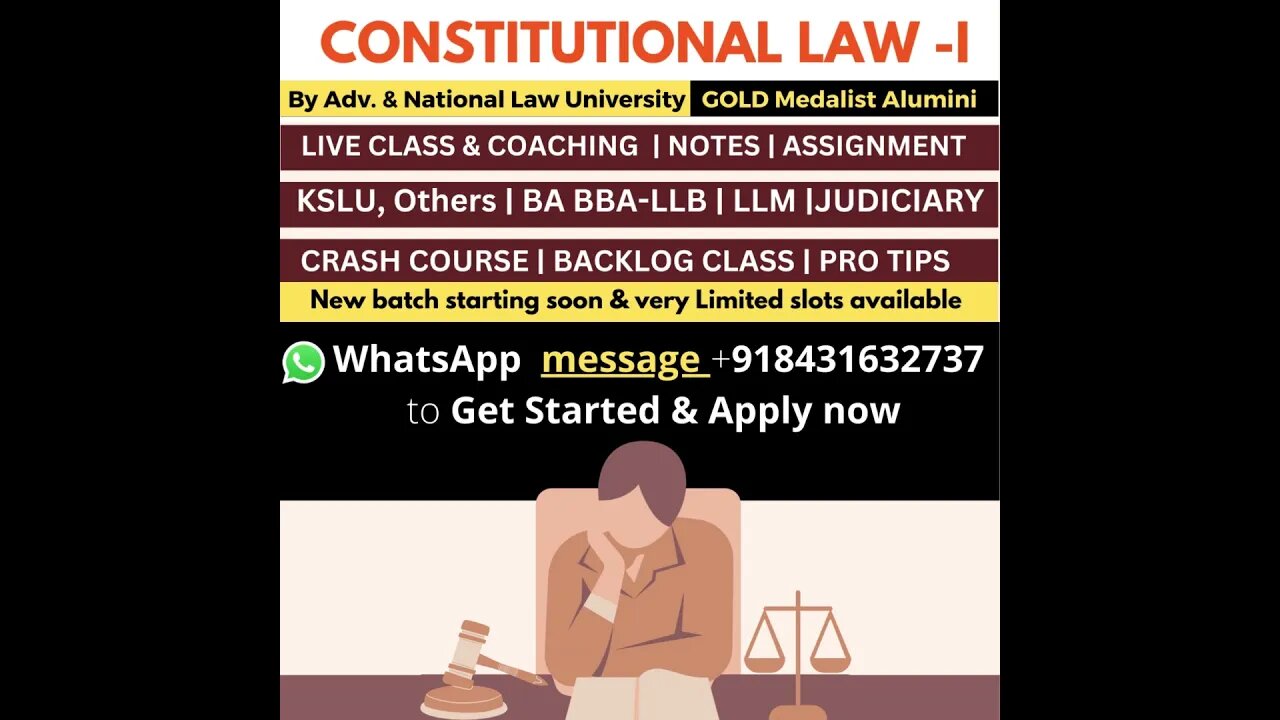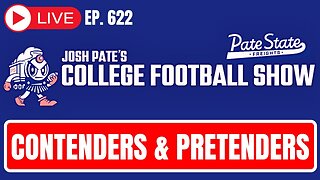Premium Only Content

CONSTITUTION LAW -I
Course content:
Unit- I
Salient Features of the Indian Constitution Preamble, Citizenship,
Fundamental Rights
Unit - II
Directive Principles of State Policy, Fundamental Duties, Parliamentary
Governrnent, Bicameralism, Legislative Process, Privileges, Council of
Ministers, President of India, Governor.
Unit - III
Judicial process under the Constitution, Nature of Judicial Review, Judicial
Review-Arts.32, 226 and 227, Court system in India, Judges-
Appointments, conditions of service, etc., Advisory Jurisdiction of the
Supreme Court, Public Interest Litigation, Activism v. Restraint.
Unit - IV
Federalism, Center-State Relations, Freedom of Inter State Trade,
Methods of Constitutional Amendment, Limitation on Constitutional
Amendment
Unit - V
Emergency provisions, Services under the State, State Liability
Prescribed Books:
Jain M.P., Indian Constitutional Law, Bombay: N M Tripathi, 1994’4th Ed.
Reference Books:
Seervai H.M. Constitutional Law of India, Bombay: N. M. Tripathi Pvt. Ltd., 1996, 3
vols
Shukla V.N., Constitution of India, Lucknow: Eastern Book Co., 1995, 9th Ed.
Basu D.D., Shorter Constitution of India, New Delhi: Prentice Hall of India Pvt.
Ltd.1994, 11th Ed. Basu D.D. Shorter Constitution of India, New Delhi: Prentice
Hall of India Pvt. Ltd., 1994,11th Ed. Austin Granville, The Indian Constitution:
Comer Stone of a Nation Oxford: Clarandon Press, 1966
COURSE-III: LAW OF TORTS
Objectives:
This course is designed to study the principles of Tortious liability, the
defences available in an action for torts, the capacity of parties to sue and
be sued and matters connection there with. Further, this course is
designed to study specific torts against the individual and property. With
rapid industrialization, inadequacy of the law to protect the individual is
exposed. An attempt shall be accorded to the individuals against mass
torts and industrial torts. Keeping in the expensive character of judicial
proceedings the students should reflect on the alternative forms, and also
forms, and also the remedies provided under the Consumer Protection
Act, 1986.
Course content:
UNIT - I
Evolution of law of torts- Nature and scope of law of torts- Meaning-
Torts distinguished from Contract- Crime- Development of Ubi jus ibi
Remedium- Mental elements-Intention, Motive, Malice in Law and in Fact.
UNIT-II
General Defences, Vicarious Liability.
UNIT -III
Negligence; Nuisance; Absolute and Strict liability. Legal RemediesAwards-
Remoteness of damage.
UNIT -IV
Torts against person: Torts affecting body- Assault, Battery, Mayhem and
False Imprisonment; Torts affecting reputation-Libel and Slander, Torts
affecting freedom-Malicious Prosecution, Malicious Civil Action and
Abuse of Legal Process, Torts affecting domestic and other rights Marital
Rights, Parental Rights, Rights to Service, Contractual Rights, Intimidation
and Conspiracy. Torts against property.
UNIT - V
Consumer Protection Act, 1986
Prescribed Books:
Ratanlal and Dhirajlal, Law of Torts, Nagpur:Wadhwa and co.
Singh Gurubax, Law of Consumer Protection, Jaipur: Bharat Law
Publications
-
 1:07:30
1:07:30
Josh Pate's College Football Show
3 hours ago $0.50 earnedBig CFB Changes Coming | USC + Texas + Alabama In 2025 | Truth About Officiating | I Am Engaged
10.3K1 -
 4:43:40
4:43:40
Biscotti-B23
6 hours ago🔴 LIVE VIEWERS VS MEMBERS BEEF 🔥 FINDING A NEW MAIN ⚔ BLEACH REBIRTH OF SOULS
1.16K -
 LIVE
LIVE
DTDUBtv
3 hours agoOUTLAST TRIALS WITH SARAHSLOTH17
116 watching -
 LIVE
LIVE
Major League Fishing
5 days agoLIVE! - MLF Bass Pro Tour: REDCREST - Day 4
8,954 watching -
 LIVE
LIVE
EricJohnPizzaArtist
3 hours agoAwesome Sauce PIZZA ART LIVE Ep. #42: It’s Cartman!
258 watching -
![[Vtuber] Black Ops 6 warzone and mp! Ep.2](https://1a-1791.com/video/fww1/68/s8/1/z/v/X/z/zvXzy.0kob-small-Vtuber-Black-Ops-6-warzone-.jpg) LIVE
LIVE
Ryker SteelVT
3 hours ago[Vtuber] Black Ops 6 warzone and mp! Ep.2
11 watching -
 9:53
9:53
China Uncensored
7 hours agoThe UK Just Screwed Itself BADLY
15.6K10 -
 LIVE
LIVE
Deaf Gamer Girl
3 hours agoFortnite then Schedule 1 - DGG play !
63 watching -
 DVR
DVR
IsaiahLCarter
8 hours ago $1.23 earnedApostate Radio #008: The Healing of Adam B. Coleman
20.1K -
 17:50
17:50
Talk Nerdy Sports - The Ultimate Sports Betting Podcast
9 hours ago4/6/25: 🔥15-1 March Madness Run 🧠🔥 | MLB, NBA & PrizePicks Picks to Cook Your Bookie
88.6K8